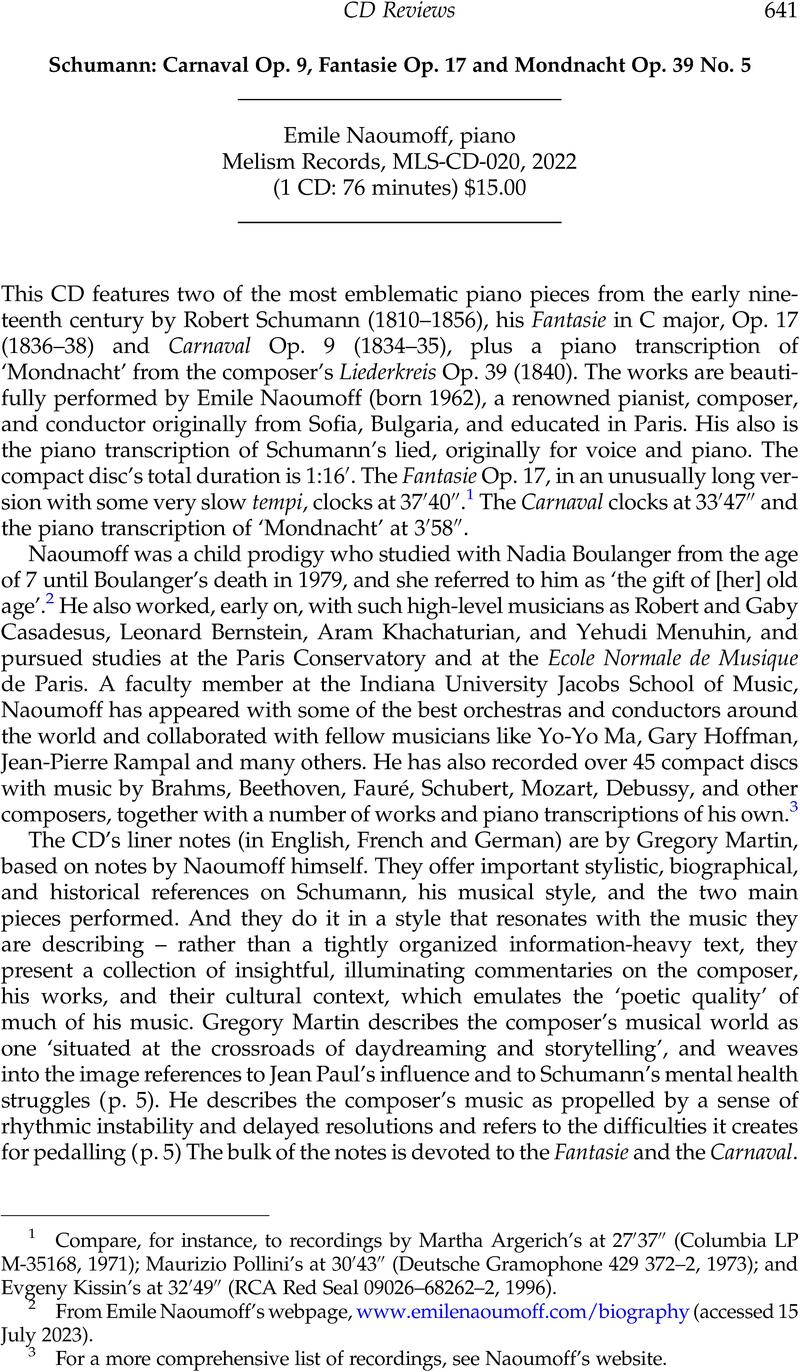No CrossRef data available.
Published online by Cambridge University Press: 25 August 2023

1 Compare, for instance, to recordings by Martha Argerich's at 27′37″ (Columbia LP M-35168, 1971); Maurizio Pollini's at 30′43″ (Deutsche Gramophone 429 372–2, 1973); and Evgeny Kissin's at 32′49″ (RCA Red Seal 09026–68262–2, 1996).
2 From Emile Naoumoff's webpage, www.emilenaoumoff.com/biography (accessed 15 July 2023).
3 For a more comprehensive list of recordings, see Naoumoff's website.
4 Marston, Nicholas, Schumann: Fantasie Op. 17 (Cambridge: Cambridge University Press, 1992): 1–22CrossRefGoogle Scholar.
5 The vocal phrase in bars 266–277 from Beethoven's song cycle appears in bars 296–297 in Schumann's piece. The quoted material is then immediately restated and elaborated upon four additional times to become the basis of the fourteen-bar Adagio that closes the Fantasie's first movement.
6 Kossmaly, Carl, ‘Über Robert Schumann Claviercompositionen’, Allgemeine Musikalische Zeitung 46/2 (1844): 20Google Scholar. All translations are by the author of this review, with immense gratitude to David Ferris for his suggestions.
7 Rosen, Charles, The Classical Style; Haydn, Mozart, Beethoven (New York: Norton, 1972): 451Google Scholar.
8 Daverio, John, ‘Schumann's “Im Legendenton” and Friedrich Schlegel's “Arabeske”’, 19th-Century Music 11/2 (1987): 150–63CrossRefGoogle Scholar.
9 Marston, Nicholas, ‘“Im Legendenton”: Schumann's “Unsung Voice”’, 19th-Century Music 16/3 (1993): 239CrossRefGoogle Scholar.
10 All analytical ideas on the movement offered here by the author can be found further elaborated and substantiated in Ponce, Adriana, ‘Form, Diversity and Lack of Fulfillment in the First Movement of Schumann's Fantasie Op. 17’, Music Theory Online 20/3 (2014)CrossRefGoogle Scholar, https://mtosmt.org/issues/mto.14.20.3/mto.14.20.3.ponce.html.
11 A normative dynamic curve describes the common arch-like trajectory of a phrase or passage, where an intensity and melodic peak is typically reached soon after mid-point.
12 Marston, Schumann: Fantasie Op. 17, 76–9.
13 Marston, Schumann: Fantasie Op. 17, 79–84.
14 See, for instance, among many others, Daverio, John, Robert Schumann: Herald of a ‘New Poetic Age’ (New York: Oxford University Press, 1997)CrossRefGoogle Scholar; Hoeckner, Berthold, ‘Schumann and Romantic Distance’, Journal of the American Musicological Society 50/1 (1997): 55–132Google Scholar; Rosen, Charles, The Romantic Generation (Cambridge, MA: Harvard University Press, 1999)Google Scholar; Riemann, Erika, Schumann's Piano Cycles and the Novels of Jean Paul (Rochester: University of Rochester Press, 2004)CrossRefGoogle Scholar.
15 Friedrich Schlegel's fragments refer to a number of writings resembling aphorisms which served as vehicles for his philosophical ideas. They appear in different journals and publications during his lifetime. For a comprehensive compilation see Schlegel's standard critical edition of his works: Behler, Ernst et al, eds, Kritische Friedrich-Schlegel-Ausgabe, 35 vols (Munich: F. Schöningh, 1958–2002)Google Scholar. For a compilation of his Lyceum and Athanaeum Fragments translated into English, see Schlegel, Friedrich, Philosophical Fragments, trans. Firchow, Peter (Minneapolis: University of Minneapolis Press, 1991)Google Scholar.